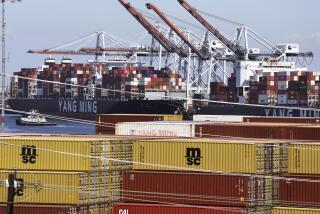Unions Support Lifting of Oil Export Ban : Energy: British Petroleum agrees to use U.S. tankers to move Alaskan crude. Deal contingent on congressional approval.
- Share via
Five key U.S. maritime unions formally agreed Friday to support lifting a federal ban on the export of Alaskan crude oil in a deal worked out with British Petroleum Co.
Breaking its silence, BP confirmed that it has agreed to preserve union jobs by using U.S.-flag tankers to ship any BP oil “that moves off the Alaskan North Slope,” said Rob Rehg, a spokesman for the London-based oil company.
The agreement is contingent on Congress adding the lifting of the ban to a pending bill that would extend the Export Administration Act. Though opposition remains among lawmakers, proponents were optimistic Friday.
“It doesn’t make it a done deal, but it certainly makes it a viable deal,” one congressional source said. “If the maritime unions really get behind this, they can sway a lot of Congress members. . . . And then if you get a good (Energy Department) study that says it’s not going to affect national energy concerns, then there’s no legitimate argument for the ban.”
A still-unreleased Energy Department report on the costs and benefits of lifting the ban estimates that as many as 494 maritime industry jobs could be lost in 1994-95 if the ban were ended without a provision requiring the crude to be transported on U.S.-flag ships.
Otherwise, the study supports proponents’ estimates that thousands of new oil field jobs--and a substantial increase in investment in California and Alaskan production--would result from lifting the ban.
Though many high-ranking members of the Clinton Administration favor lifting the ban, the White House is not likely to take a formal stand on the issue until after the release of the Energy Department report, expected June 7.
In a statement made available to The Times on Friday, executives of the Seafarers International Union; National Maritime Union; American Maritime Officers; International Organization of Masters, Mates & Pilots, Marine Engineers Beneficial Assn. ended two decades of insistence on preserving the ban, declaring that lifting it will create jobs and ensure the existence of a U.S. tanker fleet--”vessels that are militarily useful in times of conflict.”
California’s independent oil producers and other opponents of the ban have argued that it forces too much crude into the California market, depressing the regional price.
More to Read
Sign up for Essential California
The most important California stories and recommendations in your inbox every morning.
You may occasionally receive promotional content from the Los Angeles Times.













